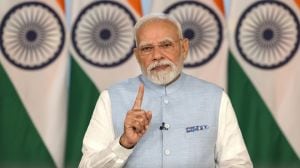Fearing Gen’s days are numbered, US starts drawing up Plan B
Almost two weeks into Pakistan’s political crisis, Bush administration officials are losing faith that the Pakistani president...

Almost two weeks into Pakistan’s political crisis, Bush administration officials are losing faith that the Pakistani president, General Pervez Musharraf, can survive in office and have begun discussing what might come next, according to senior administration officials.
On Wednesday, officials at the White House, State Department and the Pentagon huddled to decide what message Deputy Secretary of State John D Negroponte would deliver to Musharraf — and perhaps more important, to Pakistan’s generals — when he arrives in Islamabad on Friday.
Officials say they still hope that Negroponte can salvage the fractured arranged marriage between Musharraf and former Prime Minister Benazir Bhutto. But in Pakistan, foreign diplomats and aides to both leaders said the chances of a deal between the leaders were evaporating.
Several officials said that with each day, more officials were coming around to the belief that Musharraf’s days in power were numbered and that the US should begin considering contingency plans, including reaching out to Pakistan’s generals.
More than a dozen officials in Washington and Islamabad from a number of countries spoke on condition of anonymity because of the fragility of Pakistan’s current situation. The doubts that American officials voiced about whether Musharraf could survive were more pointed than any public statements by the administration, and signalled declining American patience.
Officials in Washington said the Bush administration remained wary of the perception that the US was cutting back-room deals to install the next leader of Pakistan. “They don’t want to encourage another military coup, but they are also beginning to understand that Musharraf has become part of the problem,” said a former official.
That shift in perception is significant because for six years Musharraf has sought to portray himself as the West’s best alternative to a possible takeover in Pakistan by radical Islamists.
While remote areas in northwestern Pakistan remain a haven for Al Qaeda and other Islamic militants, senior US officials now say they recognise that the Pakistani Army remains a powerful force for stability in Pakistan, and that there is little prospect of an Islamic takeover if Musharraf should fall. If Musharraf is forced from power, they say, it would most likely be in a gentle push by fellow officers, who would try to install a civilian president and push for parliamentary elections to produce the next prime minister, perhaps even Bhutto, despite past strains between them.
Such a scenario would be a return to the diffuse and sometimes unwieldy democracy that Pakistan had in the 1990s before Musharraf seized power in a bloodless coup. But the diplomats also warned that removing the general might not be that easy. Army generals are unlikely to move against Musharraf unless certain “red lines” are crossed, such as countrywide political protests or a real threat of a cutoff of American military aid. Since he invoked emergency powers, Musharraf has successfully used a huge security crackdown to block large-scale protests.
Pakistan’s cadre of elite generals, called the corps commanders, have long been kingmakers in the country. At the top of that cadre is Gen Ashfaq Parvez Kayani, Musharraf’s designated successor as army chief. Gen Kayani is a moderate, pro-American infantry commander widely seen as commanding respect within the army and, within Western circles, as a potential alternative to Musharraf. He and other military leaders are widely believed to be eager to pull the army out of politics and focus on securing the country.
Officials in Washington said they were concerned that the longer the constitutional crisis in Pakistan continued, the more diverted Pakistan’s army would be from the mission the US wants it focused on: fighting terrorism in the country’s border areas.
The officials said there was growing worry that the situation unfolding in Swat, where Islamic militants sympathetic to the Taliban and Al Qaeda are battling Pakistan’s Army, was a sign that Musharraf — and the Pakistani Army — might be too busy jailing political opponents to fight militants.
The administration officials said they were also dismayed that Musharraf last week released 25 militants in exchange for 213 soldiers captured by militants in August, and agreed to withdraw soldiers from certain areas of South Waziristan.
Since spring, concern has been growing in the armed forces that Musharraf’s battle to remain in power and his recent political blunders have cost him popularity with the public and damaged the reputation of the armed forces, analysts say.
“The army is getting more and more concerned and worried and disturbed,” said Talat Masood, a retired general and political analyst. “They have a genuine engagement in the tribal belt of Frontier Province and Baluchistan,” he said, referring to armed clashes. “And now they have such a major confrontation between the military and civil sectors of society, and the lines are getting sharper.”
While the military supports the emergency, it is doing so with caution, and there are red lines the army will not cross, Western military officials in Pakistan said. “Kayani is loyal to Musharraf,” said one Western military official. “But also to Pakistan.”
Photos





- 01
- 02
- 03
- 04
- 05

























